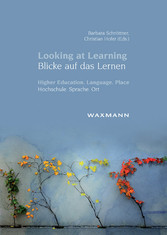Suchen und Finden
Service
Mehr zum Inhalt

Looking at Learning - Blicke auf das Lernen. Higher Education. Language. Place - Hochschule. Sprache. Ort
Learning and the World Community (S. 195-196)
Barbara Schröttner
Individuals as Global Actors? Reality is a question of perspective; the further you get from the past, the more concrete and plausible it seems – but as you approach the present, it inevitably seems more and more incredible
(Salman Rushdie 1947; Midnight’s Children)
Abstract
Today we live in a world in which there is an increasing need for learners to develop global consciousness as individuals form the cultural basis of a civil society; this encompasses global sensitivity, global understanding and global self-representation. Th e aim of this analysis is to show that learners have to take on a more active role in approaching the challenges of the 21st century so that they are able to become more dialogical, participative and critical global citizens.
This article is moreover concerned with the necessity to refl ect on and truly see other cultures as this is necessary in contemporary learning environments and, because individuals are dialogically constructed, for identity formation processes. It is in this context that this study emphasizes the fact that appreciating individual cultural diversity as a strength and approaching it with participative action in the sense of an active citizenship should be at the centre of learning practices.
From this viewpoint, building a global democratic civil society needs sustained interaction and collaboration as well as new forms of communication, decision making and direct individual participation among formal and informal actors at the community level, the national level and the international level. And fi - nally, because of the intensity of globalization dynamics and the increase of cross-border activities it should be taken into consideration that there is a need for the formation of a transnational civil society and citizenship which focuses on translocal solidarity, identityformation processes, new forms of political organization and overall on innovative, participative and dialogical learning practices.
Opening: Seeing the World Relationally
Education has been confronted with the demands of the state, specifi cally to prepare citizens for participation in the economy and in politics. Th e two traditional bases of formalized educational systems are thus economies and governance. Today globalization processes lessen national sovereignty and put limits on state autonomy; this can be observed in the tension between global and local dynamics and in almost every decision and policy domain in the social, cultural and economic spheres. However globalization not only blurs national boundaries but also changes loyalties within and outside a country (Torres, 2009: 114).
Alle Preise verstehen sich inklusive der gesetzlichen MwSt.









